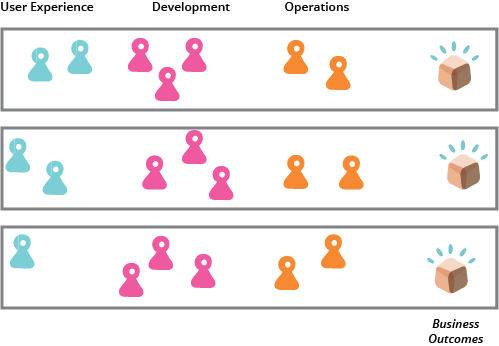tagged by: agile adoption
Agile Imposition
According to the current board of the Agile Alliance, agile methods have “crossed the chasm” , which I think means they are becoming more widespread. While this has its advantages, it also brings problems. As a methodology or design approach becomes fashionable, then we see a lot people using it, or teaching it, who are focusing on the fashion rather than the real details. This can lead to reports of things done in agile's name which are a polar opposite to the principles of movement's founders.
Dev Ops Culture
Agile software development has broken down some of the silos between requirements analysis, testing and development. Deployment, operations and maintenance are other activities which have suffered a similar separation from the rest of the software development process. The DevOps movement is aimed at removing these silos and encouraging collaboration between development and operations.
Early Pain
A few years ago I was talking with a client who told me something he didn't like about the agile approach we were using: “it doesn't feel right to have these difficulties this early in the project”. Contrary to his reaction, in my mind this early pain is one of the great benefits of an agile or indeed any iterative development process.
Extreme Programming
Extreme Programming (XP) is a software development methodology developed primarily by Kent Beck. XP was one of the first agile methods, indeed XP was the dominant agile method in the late 90s and early 00s before Scrum became dominant as the noughties passed. Many people (including myself) consider XP to be the primary catalyst that got attention to agile methods, and superior to Scrum as a base for starting out in agile development.
Fixed Price
Many people belive that you can't do a fixed price contract in an agile project. Since the whole point of an agile process is that you cannot predict the future, this isn't an unreasonable supposition. However this doesn't mean you can't come up with a fixed price agile contract, what it really means is that you can't come up with a fixed scope contract.
Flaccid Scrum
There's a mess I've heard about with quite a few projects recently. It works out like this:
- They want to use an agile process, and pick Scrum
- They adopt the Scrum practices, and maybe even the principles
- After a while progress is slow because the code base is a mess
Improvement Ravine

If you care about what you do, you care about getting better at it. This involves reflecting about how you do things, and trying out new techniques to see if they make you better. Even if other people recommend new techniques, the only way you know if they work for you is by trying them out yourself and seeing if they improve your performance.
Is Agile For All
Can average developers use agile methods?
Large Agile Projects
A common question is whether large projects can be done with agile techniques. After all many agile approaches are designed for smaller projects and the heavyweight ideas that they resist are more needed on bigger projects.
Maturity Model

A maturity model is a tool that helps people assess the current effectiveness of a person or group and supports figuring out what capabilities they need to acquire next in order to improve their performance. In many circles maturity models have gained a bad reputation, but although they can easily be misused, in proper hands they can be helpful.
Outcome Oriented

People who sponsor development of software usually aren’t very interested in development metrics such as velocity or frequency of deployment to production. They care more about business benefits that the software will deliver such as lower manual effort, better sales conversion, greater customer satisfaction, i.e business outcomes. Outcome-oriented teams are those that are mandated and equipped to deliver business outcomes, such teams have people with the capability to carry out all necessary activities to realize the outcome.. By contrast, ActivityOriented teams are neither equipped nor mandated to do so. They can only perform one of several activities required to realize an outcome.
Semantic Diffusion
I have the habit of creating Neologisms to describe the things I see in software development. It's a common habit amongst writers in this field, for software development still lacks much useful jargon. One of the problems with building a jargon is that terms are vulnerable to losing their meaning, in a process of semantic diffusion - to use yet another potential addition to our jargon.
Shifting To Code Ownership
In my recent CodeOwnership post, I described the way in which I think about code ownership issues. Many of my software development friends are extreme programmers, and tend to favor collective code ownership. However these kind of practices aren't absolute and should always be tempered by local considerations. One of my colleagues sent me a note with the following story which I thought was a good indication of when you have to vary your practices, even if you are a strong fan of XP. (As he's talking about his team, he prefers to be anonymous.)
Shu Ha Ri
Shu-Ha-Ri is a way of thinking about how you learn a technique. The name comes from Japanese martial arts (particularly Aikido), and Alistair Cockburn introduced it as a way of thinking about learning techniques and methodologies for software development.
Spreading Incrementalism
From time to time people question whether a particular specialty can be used incremental way: “You can't do (security | user interface design | databases | internationalization | * ) with an agile project because this aspect has to be done up front.”
Team Room

A common thing you find in agile projects is that the development team sits in a single open team room. It was advocated early on in Extreme Programming and called out as one of primary practices in the second edition. Agilists favor a open team room as it promotes lots of informal and deep communication between people on the team.
Utility Vs Strategic Dichotomy

One of the steady themes I've seen throughout my career is that of the nature and importance of software development. A few years ago a prospect told one of our salespeople that “software is like sewage pipes, I want it to work reliably and I don't want to know about the details”. This is the kind of approach that Nicholas Carr talked about in IT Doesn't Matter. On a contrasting note we've done work for many businesses where IT has been a clearer strategic enabler to their business, allowing them to enter new markets or significantly increase their market share. So is IT a utility, like sewage pipes, or a strategic asset?
